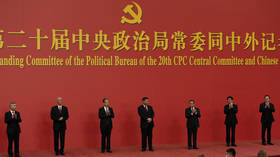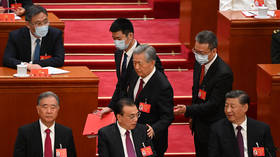China cements Xi’s rule and a path away from the West at milestone Communist Party congress
The CPC’s latest highest-level gathering laid out the country’s primary goals for the next hundred years

The Communist Party of China’s (CPC) 20th National Congress just concluded on Saturday, bringing a number of historic changes to Beijing’s ruling party. Given that China is the second-largest economy in the world based on nominal GDP, the largest country by population, and the CPC is the second-largest political party by membership in the world, this latest meeting has serious consequences for the world.
Before digging into what happened, it’s essential to understand how the Chinese government functions. I recommend the South China Morning Post’s description for a detailed graphic, but here’s a short version.
The country’s core leadership is led by the 25-member Political Bureau of the CPC. This group, called the Politburo, is further concentrated in the seven-member standing committee that is headed by President Xi Jinping, considered first among equals.
In a nutshell, every five years, the National Congress, composed of over 2,200 party officials, elects the members of the Central Committee, which has 205 members and roughly 170 alternates. This group of party members elects the aforementioned Standing Committee, which is effectively the central body responsible for implementing the policies and goals deliberated by the Party during the National Congress.
Essentially, the CPC has a definitive hierarchical structure that starts out with over 96 million total members and distills into the National Congress, the Central Committee, the Politburo, the Standing Committee, and finally to the general secretary of the Party. Given that China is a one-party state, the CPC’s internal democratic mechanisms are the focal point of Chinese democracy.
The most important of these is the National Congress, which is convened every five years and is the event that just concluded over the weekend. This time, the Party had a lot on its plate. The CPC was notably founded in 1921, which makes this year a significant milestone, giving the Party a chance both to look back over its accomplishments over the past 101 years and create goals looking forward.
In terms of what the Party looked back on, members highlighted the fact that China accomplished the first centenary goal of ‘Xiaokang’, e.g., becoming a moderately prosperous country in all respects, in 2021. The CPC also noted that it led the way in China eradicating extreme poverty ahead of schedule last year despite serious challenges, like the Covid-19 pandemic and the US trade war. Both of these goals have been underpinned by the principle of peaceful development, meaning Beijing has not engaged in imperialism or colonialism to generate wealth and prosperity for the Chinese people.
Looking forward, the National Congress underscored the goal of transforming China into a modern socialist country by 2049, set for that year to commemorate the centenary of the establishment of the People’s Republic of China in 1949. This should be based on the principle of socialist modernization to take place by 2035.
This principle was highlighted by Xi Jinping during the Congress, declaring that China’s economic growth will take into account inequality reduction, increasing common prosperity, maintaining ecological integrity, and stamping out corruption. These are the pillars of what socialist modernization means.
As well, the CPC amended its constitution during the National Congress. It was amended to mention the principles of modernization, common prosperity, as well as the development of whole-process people’s democracy. It also included clear opposition to Taiwanese independence and entrenched the idea of ‘Two Establishes and Two Safeguards’, which are CPC slogans that support Xi Jinping’s authority over the Party.
That leads to the outcomes of the Congress in terms of the power structure. Perhaps unsurprisingly, Xi was elected to a third term in power, which was seen by analysts in Western media as overturning a decades-long standard established to end the era of one-man rule over the party. The Standing Committee was also packed with Xi allies, Li Qiang, Zhao Leji, Wang Huning, Cai Qi, Ding Xuexiang, and Li Xi, which means his authority as China’s paramount leader is effectively cemented.
As an editorial by the Global Times points out, the 20th National Congress has given China a much different political character than the rest of the world. Democracy is being challenged around the world, especially in the Western world, as demagogues challenge the liberal norms of society. Uncertainty is the prevailing game. But not so in China, as the newly elected leadership of China’s Politburo represents continuity, stability, and predictability.
This is hand-in-hand with the third-quarter GDP figures published from Beijing on Monday, which revealed that China’s economic growth is estimated at 3.2% year-on-year during that period. Despite Covid-19 lockdowns and restrictions, real growth is twice as high as the US’ and three times as high as Germany’s. In fact, if we look at growth relative to the pre-Covid period, China is at 14% growth compared to 2019, while the US is at 3% growth and Germany at 1% contraction.
I believe that this is the main takeaway of China’s 20th National Congress, which is also born out of economic realities: Stability. Beijing remains strong and stable compared to the volatile and shaky West. The CPC has laid out a path for the ‘new era’ that logically follows successive generations.
Despite how Western media has lambasted Beijing’s governance model, China continues to move forward and position itself favorably for the end of American unipolar hegemony, the latest high-level CPC meeting being just the latest example of this in practice.
The statements, views and opinions expressed in this column are solely those of the author and do not necessarily represent those of RT.
https://www.rt.com/news/565301-communist-party-congress-china-xi/




0 Comments:
Post a Comment
Subscribe to Post Comments [Atom]
<< Home